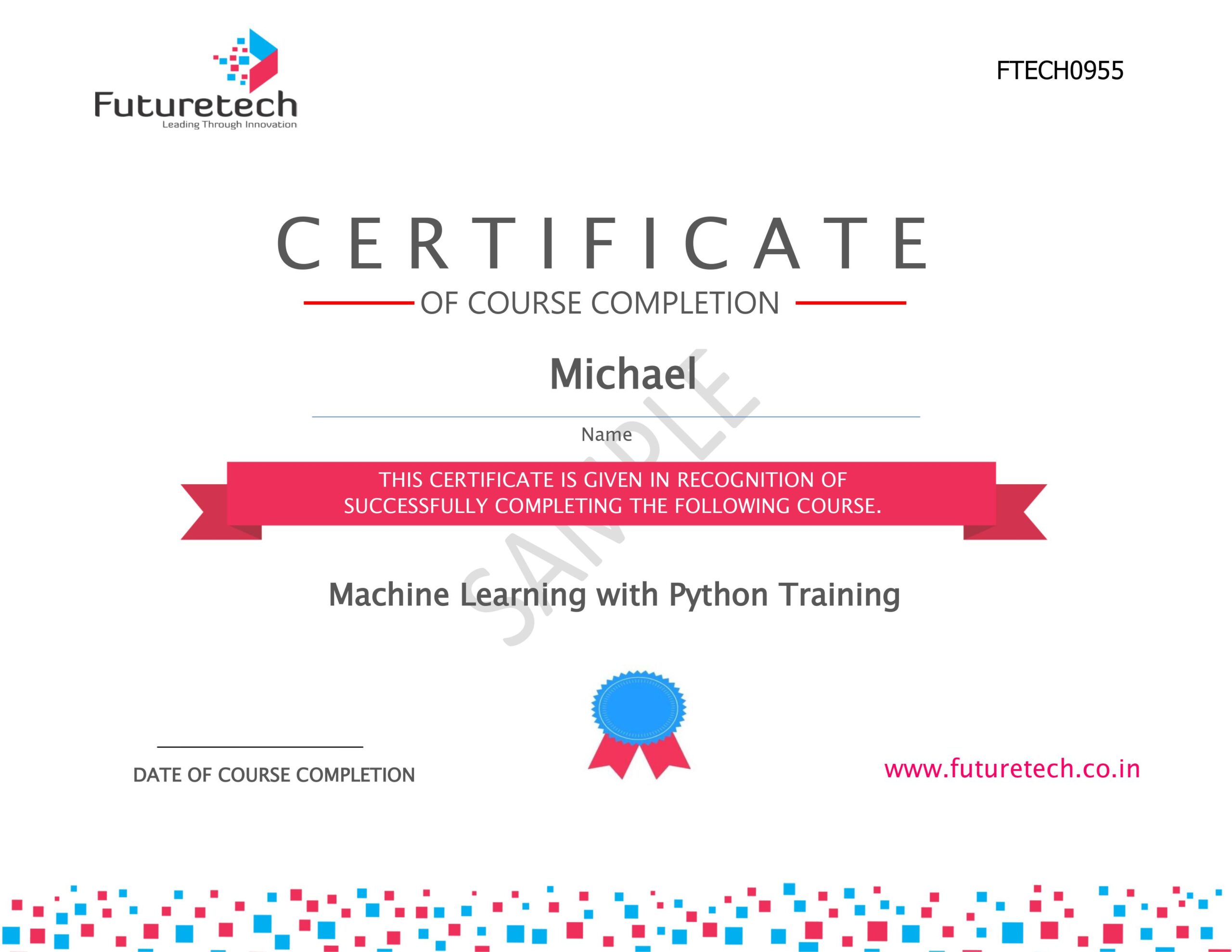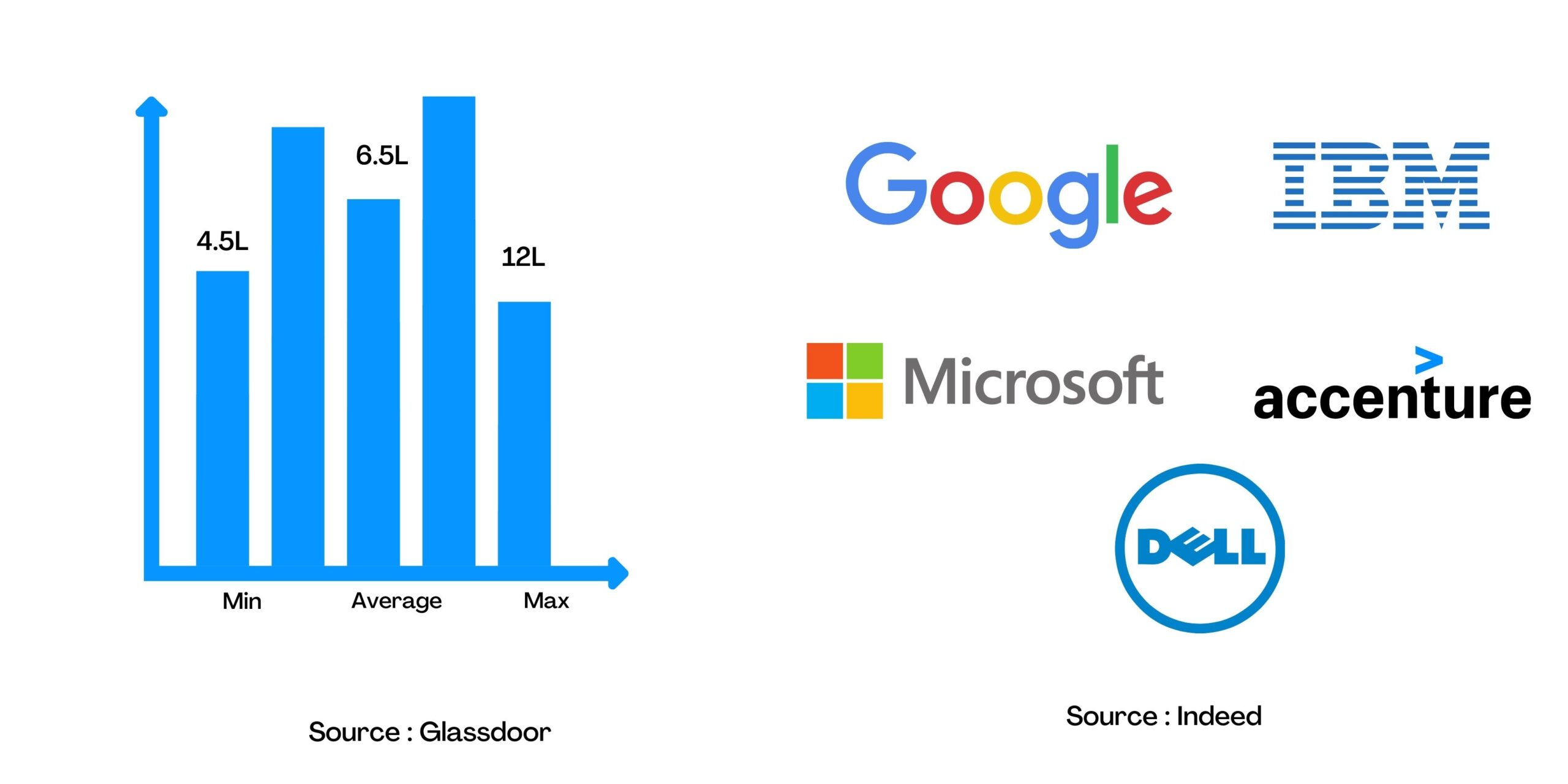- Home
- Machine Learning with Python Course
Machine Learning with Python Course
Deploy the full capacity of deep learning into modern-day applications. Learn to create Machine Learning algorithms with Python and R programming languages.
- 4.8 Ratings / 2200 Reviews
- 5000+ Professionals Enrolled
- 98.3% Success Rate
Request a Callback
Menu
Course Overview
General Description
This Machine Learning with Python course covers the fundamentals of machine learning using a simple and well-known programming language. You’ll learn about Supervised vs. Unsupervised Learning, as well as how Statistical Modeling relates to Machine Learning and how they differ.
Key Features
- Earn industry recognised ML Python certifications as you complete the course
- Fast-track your career with able mentorship from industry leaders
- 100% Job/Placement assistance
- Get IAI-powered interactive courses to kick-start your career in ML Python
Course Objectives
At the end of this ML Python Course, you will be able to
- Apply the core concepts of ML Python to the real-time business problems
- Learn the methodologies of problem formulation for better solutions
- Master the functionalities of machine learning, traditional programming, and supervised learning
- Learn about predictive model and execute real-time projects in Machine Learning
Course benefits
- This Machine Learning with Python course covers the fundamentals of machine learning using a simple and well-known programming language. You’ll learn about Supervised vs. Unsupervised Learning, as well as how Statistical Modeling relates to Machine Learning and how they differ.
Target Audience / Prerequisites
- Anyone keen to learn machine learning algorithms using Python.
- Any person who wants to learn about the practical application of machine learning to solve real-world problems.
- Individuals with basic knowledge of Machine Learning who want to develop their understanding of the machine learning algorithms.
- Intermediate EXCEL users not able to work with large datasets.
- Anyone looking to start a career as a data scientist.
- Individuals who want to utilize and apply the technology of Machine learning to their domain.
Certification


Sample Certificate
- After successfully completing the training programme, as well as the real-time hands-on and projects, you will be awarded a Futuretech course completion certificate.
Course Duration & Course Schedule Date
- Duration: 40 Hours
Course Outline
- Why Machine Learning?
- Why Python?
- Scikit-learn
- Essential Libraries and Tools
- Python 2 Versus Python 3
- Versions Used in this Book
- A First Application: Classifying Iris Species
- Summary and Outlook
- Classification and Regression
- Generalization, Overfitting, and Underfitting
- Supervised Machine Learning Algorithms
- Uncertainty Estimates from Classifiers
- Summary and Outlook
- Types of Unsupervised Learning
- Challenges in Unsupervised Learning
- Preprocessing and Scaling
- Dimensionality Reduction, Feature Extraction, and Manifold Learning
- Clustering
- Summary and Outlook
- Categorical Variables
- Binning, Discretization, Linear Models, and Trees
- Interactions and Polynomials
- Univariate Nonlinear Transformations
- Automatic Feature Selection
- Utilizing Expert Knowledge
- Summary and Outlook
- Cross-Validation
- Grid Search
- Evaluation Metrics and Scoring
- Summary and Outlook
- Parameter Selection with Preprocessing
- Building Pipelines
- Using Pipelines in Grid Searches
- The General Pipeline Interface
- Grid-Searching Preprocessing Steps and Model Parameters
- Grid-Searching Which Model To Use
- Summary and Outlook
- Types of Data Represented as Strings
- Example Application: Sentiment Analysis of Movie Reviews
- Representing Text Data as a Bag of Words
- Stopwords
- Rescaling the Data with tf–idf
- Investigating Model Coefficients
- Bag-of-Words with More Than One Word (n-Grams)
- Advanced Tokenization, Stemming, and Lemmatization
- Topic Modeling and Document Clustering
- Summary and Outlook
- Approaching a Machine Learning Problem
- From Prototype to Production
- Testing Production Systems
- Building Your Estimator
- Where to Go from Here
- Conclusion
Reviews
Shaik Abdullah (Visteon)
★★★★★
Read More
Overall experience is very good. Guidelines given by trainers were excellent. It is well designed course with practical orientation
Lipsa Tripathy (Mindtree Ltd)
★★★★★
Read More
All of the trainers were excellent, extremely professional and knowledgeable and created positive learning environments.
Rajeev (CSC India Pvt)
★★★★★
Read More
I thoroughly enjoyed this training. The tutor's attitude was exemplary. He displayed a good knowledge of the subject and built up a rapport with the attendees in no time.
Priyanka Mishra (GI)
★★★★★
Read More
This place is great for doing corporate training- a central location and well equipped. Good facilities for lunch and with good travel links - an ideal venue
Sourav (Mindtree Ltd)
★★★★★
Read More
Very well organised and implemented. A lot of lessons learned. The training was commendable and the trainers were also professional. Overall a good experience.
Previous
Next
Job Opportunities


FAQ
If you want to go for higher education, the Machine Learning AI Certification by Stanford University (Coursera) is one of the best certifications.
Yes, you can learn Artificial Intelligence at home with Future Tech’s course on ML and AI. The system provides hands-on experience to work with real-time projects.
Yes, AI is now affecting the virtual mode of every industry today. So, being certified in AI and ML gives you a competitive edge.
As per the type classification of AI, there are four types- limited memory, reactive, self-aware, and theory of mind.
The average salary for an AI engineer is around 8 lakhs. This is significantly higher average salary than any other tech today.
Machine Learning with Python Course
On Request
₹20,999.00 ₹15,999.00
Schedule Starts From : 08th OCT ( 5 Weekends )

